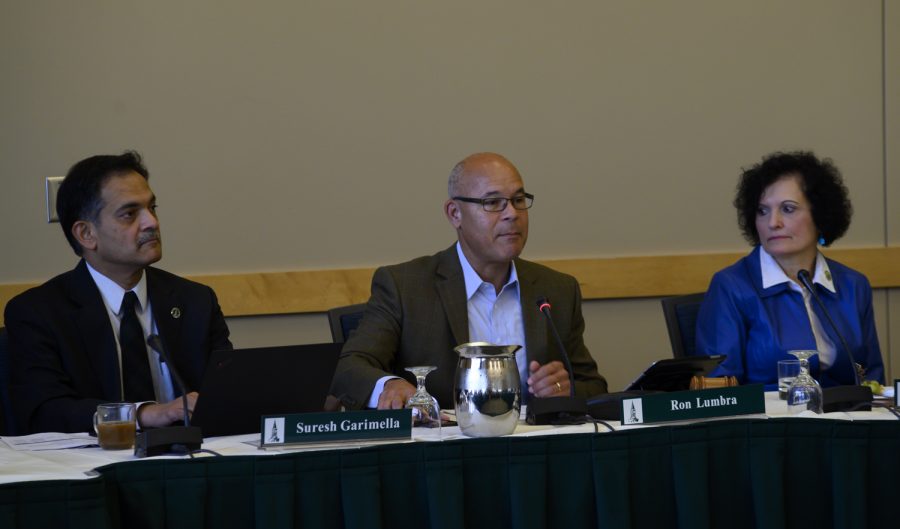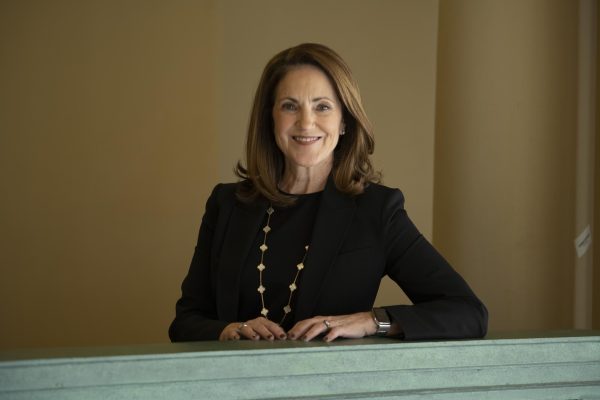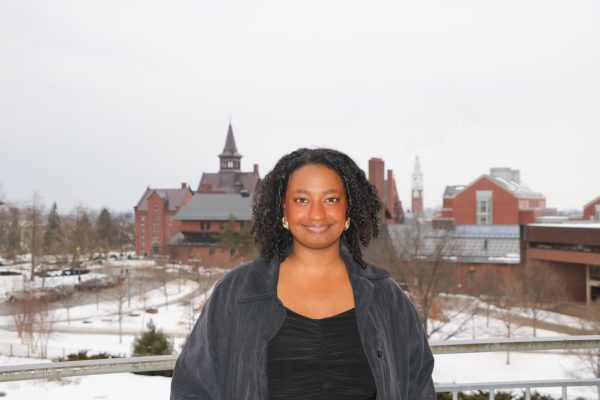Five key takeaways from the board of trustees’ first meeting
Mac Mansfield-Parisi/The Vermont Cynic
(Left to Right) President Suresh Garimella, Chair Ron Lumbra and Provost Patricia Prelock sit at a board of trustees meeting, Oct. 26.
UVM will fund police patrols of student neighborhoods despite a $23 million budgetary shortfall from lower levels of student enrollment, the board of trustees decided in their first meeting of the year.
The board met virtually for the first time this academic year Sept. 25 to discuss the trajectory of the University amidst the pandemic.
In addition to discussing enrollment updates and the financial burden of the pandemic, the Board heard from faculty during public comment who expressed their disagreement with the administration’s budget cuts and relationship with staff.
Here are five key takeaways:
1. UVM refunds controversial police patrols:
UVM will pay the Burlington Police Department $100,000 to patrol student neighborhoods in an effort to enforce UVM, city and state COVID-19 regulations, according to a resolution passed by the board.
This amount is consistent with previous “education circuits” the school has funded over the last several years, which are typically used to address noise complaints.
“This first agreement arose out of the city’s concerns expressed by some of its citizens that students will engage in risky behavior, particularly during COVID, like hosting large, unmasked parties,” said Sharon Reich Paulsen, UVM vice president for legal affairs and general counsel.
The COVID-related patrols originally started in June 2020 but were terminated shortly thereafter due to “low levels of activity,” according to UVM.
Many students spoke out against the patrols in the Spring, and some called on UVM to cut ties with Burlington Police Department, saying the relationship made Black, Indigenous and people of color feel unsafe.
2. Provost pushes for more in-person spring instruction:
The administration will push for more in-person learning in the spring after enrollment data shows fewer students came back to UVM this fall.
Provost Patty Prelock presented the updated statistics on enrollment to board members, noting a 1.9% decrease in overall enrollment, from 13,548 students to 13,292, roughly 1,400 of which opted for the online option this semester.
Jennifer “J” Dickinson, the associate provost for academic affairs, said that in-person instruction has been the most fulfilling for faculty and students according to feedback.
“We want to improve the experience of at-home students and work on really engaging remote experiences,” she said. “We also are working with the new schedule of courses to increase the potential percentage of fully in person classes and to make it easier for professors to do more in-person instruction if they so choose.”
Because a number of out of state students deferred to Spring of 2021, Prelock said the school is working to improve the student experience for the Spring to try and get most of those deferrals to still come to UVM next semester.
3. Budget committee talks budget cuts amid economic shortfalls:
Significantly fewer out-of-state students and slightly more in-state students enrolled this semester, costing the University approximately $23 million in tuition.
The board of trustees discussed the consequences of this and other COVID-19 related expenses during the Budget, Finance and Investment Committee meeting.
Although the University expects to receive about $10 million from the state and federal government through the CARES act to cover expenses related to COVID-19, President Suresh Garimella said the full cost of COVID-19 could easily be $10 million more than that.
To mitigate these expenses, the budget committee has decided to reduce salaries at various levels and make budget cuts across the entire institution.
The first cuts will fall on academic units that do not generate revenue, such as the Honors College. Then, the committee opted to cut from non-academic units, rather than academic units, to maintain the school’s educational quality.
However, this will still only cover a fraction of the cost.
“We have to find a way to structure ourselves, and enhance revenue such that we can balance next year’s budget without returns,” said VP of Finance Richard Cate.
Members of the committee stressed that the financial loss UVM is facing will have long-term impacts for years to come, depending on how quickly the student body returns to its normal size.
4. Faculty and staff morale at an all-time low:
Faculty and staff morale are at an all-time low from economic hardship and neglect from the administration, according to a report presented to the board.
“My updates on non-represented staff are the least positive of my tenure as president,” stated Steve Lunna, president of the Staff Council in his staff report.
The report explains that July pay cuts on non-represented staff combined with other COVID stressors have taken a toll on staff.
“This loss of pay has been difficult for many struggling to meet essential needs during the pandemic,” the report stated.
Lunna’s report referenced a survey conducted on staff which found they feel they are shouldering the bulk of the financial burden, that they are unheard by administration, and that they are overworked.
The survey also found staff experience a dismissive and sometimes hostile climate for BIPOC members of the community, including the choice to discontinue flying the Black Lives Matter flag.
Additionally, five professors took time during public comment to express their grievances at the University for their lack of support during the pandemic.
“Our cherished institution, despite its emphasis on the common ground, is squandering the goodwill and core of the very souls whose tireless commitment maintains this University through thick and thin while administrators have come and gone,” said Susan Comerford, an associate professor of social work.
Patrick Brown, chair of the United Academics Civil Rights Committee and a UVM professor called on the Trustees to reinstall the Black Lives Matter flag to help prevent systemic racism.
“It is indeed a small step, but a significant one,” he said. “The faculty and students and indeed, the greater community feel it is important to fly the Black Lives Matter flag to send a strong message that Black lives do matter.”
Julie Roberts, president of United Academics and a Linguistics professor, said that at a time where the UVM administration could have chosen to step up, they let the professors down.
“The current UVM administration appears to have chosen a leadership style grounded in maximum control and minimum collaboration,” she said.
She and other faculty members never received a response from the president or the provost about their concerns and have been repeatedly rejected when trying to meet with the higher administration, according to Roberts.
Lunna also announced his resignation in the report, citing the need to prioritize other responsibilities.
5. Board members look to federal government for more funding:
UVM is also looking to the federal government for more funding to offset COVID-19 costs, according to state legislators that spoke during the Vermont Agricultural College Board.
Wendy Koenig, director of federal and state relations, said UVM has received a large amount of Coronavirus Relief Fund dollars but cautioned that the new year will be difficult.
“When we start back in January it’s going to be a really challenging year, state revenue will be down due to COVID,” Koenig said. “We’ll be in a position of really trying to fight for budget dollars in a climate that’s going to be more challenging than it usually is.”
Koenig noted that if or how much money UVM receives in the new year from the federal government will largely depend on what happens in the November election.
Koenig also said the relationship between UVM’s administration and the Vermont state government can impact how much money UVM is allocated, and that the current relationship has been strong.
“I think the one very good thing that has come out of this and the last few months is that president Garimella and the Governor have strengthened their relationship and talk relatively frequently.”
Ella Ruehsen, Lilly Page, Paige Fisher and Emma Pinezich contributed to the reporting for this story.










